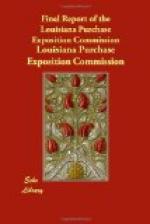The amount set apart by the Chinese Government to meet the expenses connected with China’s participation in the Louisiana Purchase Exposition was 750,000 taels, or, roughly speaking, $500,000 gold. As with all previous expositions in which China has taken part, the collecting of exhibits was intrusted to the imperial Chinese maritime customs service, under the control of Sir Robert Hart, Bart., G.C.M.G., inspector-general of customs. This service, with its numerous branches and ramifications throughout the Empire and an experienced staff acquainted with both native and foreign tastes was in an exceptional position to succeed in making a representative collection of the best in Chinese arts, manufactures, and products. The commissioners of customs at the principal trading centers took the work in hand, selecting such exhibits as were suitable when offered by merchants, and purchasing outright such articles as could not be procured otherwise. The collections were made at the following treaty ports: Newchang, Tientsin, Chefoo, Chungking, Hankow, Kiukiang, Wuhu, Nanking, Chinkiang, Shanghai, Hangchow, Ningpo, Wenchow, Foochow, Amoy, Swatow, Canton, Pakhoi, Kiungchow, Mengtse, Lungchow, and Szemao.
Besides the Government exhibits from the foregoing-mentioned places, the provincial authorities of Hupeh, Hunan, Kiangaan, and Fukien also made collections. This is noteworthy, as it was the first time on record that the regular Chinese officials have taken any interest in a foreign exhibition. In addition to the Government participation, fifty-three firms and private individuals sent their quota of exhibits. The following table gives the kind, class, and approximate value of exhibits installed by each:
Porcelain curios, cloisonne, carpets, art work in metal, tapestries, furniture, silks, ivory, fans, and jade ...... $510,200 Furs and skins ............................................ 6,500 Cement and fire bricks .................................... 1,000 Fancy articles, wood carvings, paintings, and drawings, etc 11,600 Collections of butterflies ................................ 100 Preserved meats, fish, vegetables, and fruit .............. 100 Chinese postal stamps and coins ........................... 5,000 Silverware and lanterns ................................... 2,750 ------------ Total ................................................... 537,250 Government exhibits ....................................... 40,000 Provincial ................................................ 61,000 ------------ Grand total ............................................. 638,250
The collection made by the twenty-two treaty ports comprised such articles as were not offered by the mercantile class. In nearly every case the ports’ collection included samples of products and manufactures typical to the district, models of the prevailing architecture and of any special costume worn by the people, models




